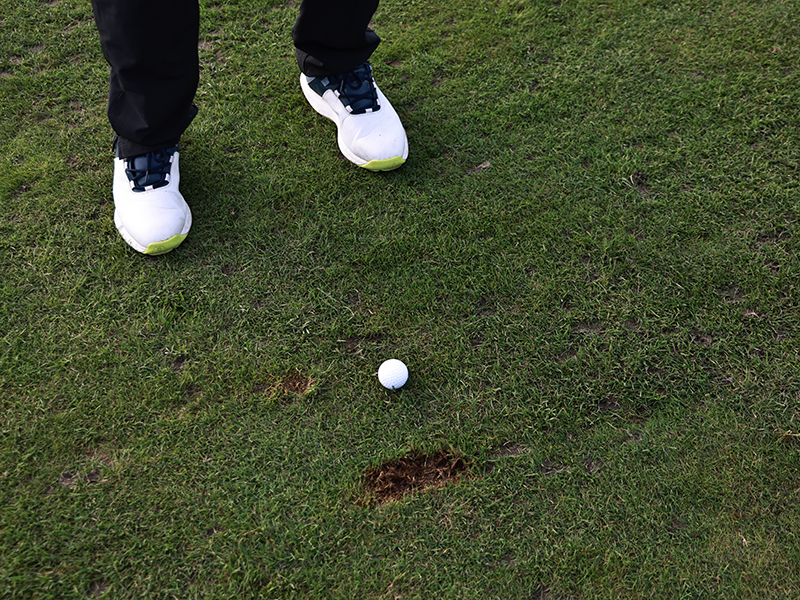‘If The Values Of Your Sport Do Not Match The Core Values Of A New Generation, It Will Very Quickly Wither And Die’ – Why Golf’s Gen Z Culture Clash Could Have Serious Ramifications For The Game’s Future
An expert in psychology has warned that golf’s rule book could be a barrier to participation for the next generation of players and advised a wider review on the sport’s regulations


Subscribe to the Golf Monthly newsletter to stay up to date with all the latest tour news, equipment news, reviews, head-to-heads and buyer’s guides from our team of experienced experts.
You are now subscribed
Your newsletter sign-up was successful
Want to add more newsletters?

Delivered daily
Daily Newsletter
Sign up for all the latest tour news, gear reviews, head-to-heads and buyer’s guides plus features, tips from our top 50 coaches and rules advice from our expert team.

Once a week
Kick Point
Sign up to our free Kick Point newsletter, filled with the latest gear reviews and expert advice as well as the best deals we spot each week.

Once a week
Women's Golf Edit
Sign up to our free newsletter, filled with news, features, tips and best buys surrounding the world of women’s golf. If you’re a female golfer, you won’t want to miss out!
Historically, participation in golf has been up-and-down, and while things seem rosy at the moment – a product of the sport’s boost in popularity in the wake of the Covid-19 pandemic – it’s not something that can ever be taken for granted.
That’s why a recent report about how golf’s rules are perceived by the younger generation is potentially problematic. Indeed, experts have expressed their concerns over Gen Z’s adherence to the game’s regulations and warned the sport could struggle to grow if the needs of the next generation of players are not met.
The Mackenzie Survey, which first ran in 2010 and is now carried out every year by Sport Psychology Ltd (SPL), looks at the relevance of the 13 golf design principles established 100 years ago by revered course designer Dr Alister Mackenzie. In addition, it asks respondents to add ‘Principle 14’, which is something they’d like to see addressed in the game.
While this year’s iteration is still ongoing, a significant number of those taking part in the survey have expressed their displeasure with having to play their ball from divots in the fairway. Interestingly, all respondents who made this observation were born between 1997 and 2012 and thus classified as Generation Z.
PSYenz, the specialist neuroscience division of SPL, has run a number of focus groups off the back of the feedback, speaking to both Gen Z golfers and non-golfers about the specific issue of balls finding divots and the rules more generally.
The focus groups were comprised of 21 golfers - 19 male and two female – and 28 non-golfers. Everyone who took part believed the fairway divot rule was inherently unfair.
The prevailing feeling was one of dismay – why should a good shot be punished in such a way, especially if it was as a result of poor care or etiquette from a fellow competition? The issue of the person creating the divot playing from a perfect lie also fed into the perceived injustice.
Subscribe to the Golf Monthly newsletter to stay up to date with all the latest tour news, equipment news, reviews, head-to-heads and buyer’s guides from our team of experienced experts.
“When I was looking at survey responses and specifically the ‘14th principle’ section, for the first time ever, I saw all these comments about playing from divots in the fairway,” says Stephen Smith, who is the chief psychologist/neuroscientist and founder of Sport Psychology Ltd.
All of the respondents who mentioned fairway divots fell into the Gen Z categorisation – they were between 12 and 27 years old – and either worked in the golf industry or played the game.

Plenty of Gen Z golfers feel that having to play from a divot is unfair, and would instead prefer to replace it on the fairway
“It kept coming up, so it was something I had to dig into. I’d never seen it before, so I wanted to see if it was a statistical anomaly or if there was more to it. I wanted to do some qualitative research as well as quantitative, so I got some focus groups together.
“The regular golfers obviously knew the score, but for the non-golfers, there was a bit of explanation about what was meant by the fairway, what a divot is and so on.
“I was absolutely shocked by the results. To a person, they all said ‘well that’s wrong’ and, interestingly, ‘that’s not fair’. Fairness is a really interesting concept in psychology. Humans are all hard-wired to recognise when something or someone is being unfair to us. Interestingly, we’re not hard-wired to recognise when we’re being unfair to other people.
“Humans and all animals notice when things around them – the environment in particular – aren't fair. A strategy that’s deeply hard-wired in our lower primaeval brain is to work out whether an environment is giving us an advantage or whether it’s disadvantaging us. If it’s the latter, the drive is to move to another environment that does offer advantage. That’s a survival strategy for any species.”

Stephen is the Chief Psychologist/Neuroscientist and founder of Sport Psychology Ltd – the UK’s oldest specialist consultancy in sport psychology. He started his professional career as a business psychologist and went on to be one of the founders of the British Psychological Society (BPS) Division of Sport and Exercise Psychology (DSEP) in 1992. He is currently the UK Chair for DSEP. He was a Partner of the UK regulator of psychologists (The Health and Care Professions Council- HCPC) for 15 years and he assessed all UK university postgraduate programmes that lead to registration with the HCPC – apart from the three universities where he lectures in Sport Performance Psychology. He has worked with many leading sports people, one of whom won a Major. He now specializes in the psychology of sports venue and equipment design. He is a member of the 'College of Experts' – a select group of independent scientific advisors to the UK government. He is assigned to support the Department of Culture, Media and Sport (DCMS).
While he’s not able to put his finger on why Gen Z think and feel as they do, Stephen believes this mindset shift is something the golf industry should absolutely be sitting up and taking notice of.
“In previous generations, because of cultural factors which have overridden environmental ones, we’ve very much had the Victorian ‘life is unfair, live with it, suck it up’ attitude. Golf has reflected that. We haven’t had to change rules as a result and people have accepted that golf is inherently unfair.
“The golf industry has been able to get away with it, because for whatever reason, previous generations have gone ‘okay, that’s fine, we accept that’.
“But Gen Z isn’t like that. In the focus group, people kept saying that playing from divots in the fairway was an ‘unnecessary unfairness’. Why would they play a game where the person in front of them had a perfect lie, but they’ve hit it to the same spot and been denied that because someone didn’t repair a divot? That’s the prevailing feeling.
“Whatever you think of that element of the rules, what I can say is this: if you’re trying to grow the game of golf into the next generation, you are on to an absolute loser unless you adapt.”
Clearly, golf has undergone a series of significant changes throughout the course of its history and the game we see today is very different to its first iteration. The rules are modified every four years and a great deal of global thought and attention goes into the process.
“Golf has always adapted,” says Stephen. “Previous generations would have said the stymie was an acceptable part of the sport. That’s obviously now obsolete because people rallied against it. The game has to adapt to meet the values of the next generation. Gen Z has looked at the fairway divot issue and said ‘no, we’re not accepting that’.
“Another element was winter rules. When I explained to the group of non-golfers that you can move a ball in the fairway during winter, they were baffled. They absolutely understood the difference between the rough and the fairway, and that you shouldn’t expect a good lie if you hit it into the thick stuff. But they were adamant that not being able to move your ball from a fairway divot was a stupid rule. One of them said, ‘why would I play a game like that?’”

Winter golf rules were also a point of debate in the study...
So, could golf’s rule book hold the game back to such a degree that it has a tangible impact of participation among Gen Z and future generations?
“Absolutely,” says Stephen. “It’s adapt or die, whether you agree with it or not. If you’re the leaders of a sport, and your objective is to maintain its success and grow it, you have to listen to the generation coming through, who are clearly saying ‘the core values and rules of your sport do not match mine’.
“The social norms in society change from generation to generation and we’re seeing a big sea change in terms of Gen Z values – as a lot of employers are finding out right now. If the values of your sport do not match the core values of the new generation, your game will very quickly wither and die.”

Nick Bonfield joined Golf Monthly in 2012 after graduating from Exeter University and earning an NCTJ-accredited journalism diploma from News Associates in Wimbledon. He is responsible for managing production of the magazine, sub-editing, writing, commissioning and coordinating all features across print and online. Most of his online work is opinion-based and typically centres around the Majors and significant events in the global golfing calendar. Nick has been an avid golf fan since the age of ten and became obsessed with the professional game after watching Mike Weir and Shaun Micheel win The Masters and PGA Championship respectively in 2003. In his time with Golf Monthly, he's interviewed the likes of Rory McIlroy, Justin Rose, Jose Maria Olazabal, Henrik Stenson, Padraig Harrington, Lee Westwood and Billy Horschel and has ghost-written columns for Westwood, Wayne Riley, Matthew Southgate, Chris Wood and Eddie Pepperell. Nick is a 12-handicap golfer and his favourite courses include Old Head, Sunningdale New, Penha Longha, Valderrama and Bearwood Lakes. If you have a feature pitch for Nick, please email nick.bonfield@futurenet.com with 'Pitch' in the subject line. Nick is currently playing: Driver: TaylorMade M1 Fairway wood: TaylorMade RBZ Stage 2 Hybrid: Ping Crossover Irons (4-9): Nike Vapor Speed Wedges: Cleveland CBX Full Face, 56˚, Titleist Vokey SM4, 60˚ Putter: testing in progress! Ball: TaylorMade TP5x